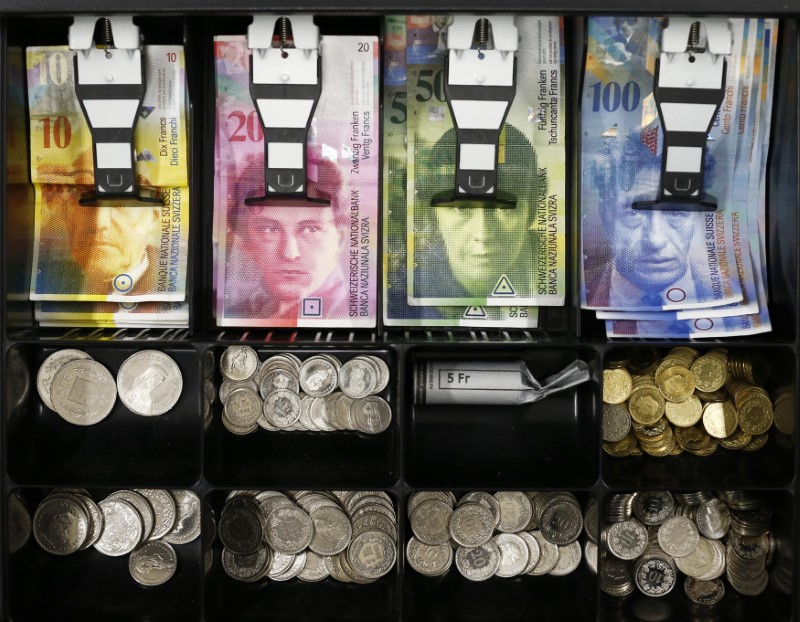By Yoruk Bahceli and John Revill
LONDON/ZURICH (Reuters) - The Swiss franc hit its strongest against the euro in almost three years on Tuesday after the United States added Switzerland to its watchlist of currency manipulators.
Analysts said the inclusion could discourage the Swiss National Bank (SNB) from intervening to try and limit further appreciation of the franc, although the Swiss finance ministry said it would have no immediate consequences.
The U.S. Treasury Department said in a semi-annual report on Monday it had added Switzerland to a list of countries where it had concerns about currency practices, accusing authorities of "markedly" increasing foreign exchange purchases since mid-2019.
The SNB has bought huge amounts of foreign currencies in recent years to dampen demand for the franc, whose safe-haven status attracts investors during times of uncertainty.
The SNB denied its interventions to weaken the currency are intended to give Switzerland a trading advantage, citing the negative effects on inflation and its export-dependent economy from a too highly valued franc.
The finance ministry on Tuesday rejected the U.S. allegations and said it was not steering the franc for competitive gain.
Switzerland's inclusion in the U.S. Treasury's list puts it alongside countries including Germany, South Korea and Japan.
"The only reason not to be bullish on Swissie is the SNB (intervention) and if they intervene less -- whether it's because of the report or their own choice -- the result is still the same," said Marie Owens-Thomsen, chief economist at Geneva wealth manager Indosuez.
"If the SNB doesn't combat the trend, then the Swissie has to appreciate," she added, citing the country's enormous current account surplus.
The euro dropped nearly 0.5% to 1.0760 francs (EURCHF=EBS), leaving the Swiss currency at its strongest since April 2017.
The dollar fell 0.4% to 0.9669 francs , although that was some way off the franc's 16-month high of 0.9647 on Dec. 31.
(GRAPHIC - Swiss franc rallies: https://fingfx.thomsonreuters.com/gfx/mkt/13/991/986/chf.png)
The franc had been firmer throughout the day, then gained further in European mid-morning trade, well after the U.S. watchlist's publication late on Monday.
Some analysts said Switzerland's inclusion on the watchlist had been expected. Instead they cited general safe-haven flows as driving franc strength.
However, prices of two other popular safe havens gold and the Japanese yen , were down on Tuesday.
The U.S. inclusion of Switzerland on the list could encourage hedge funds to once again test how far they can push the franc higher before the SNB intervenes.
MORE HANDS-OFF
The United States also encouraged the Swiss authorities to publish all intervention data more frequently.
As well as intervening directly, the SNB has also imposed the world's lowest interest rates to deter investors.
The SNB has always stressed its policy objective is ensuring price stability while taking due account of economic developments.
There have been some signs of a more hands-off approach by the SNB in recent months. Franc sight deposits at local banks, a proxy for measuring SNB interventions, have fallen, although this could be due to seasonal fluctuations.
Indosuez's Owens-Thomsen said it was "open to doubt" whether countries named by the United States were indeed manipulating their currencies.
"If you look at the sight deposits with the SNB, there is no real evidence of them doing anything (to curb franc strength), people looking at those numbers could draw the conclusion the SNB is not actively intervening. Whether that's related to the U.S. list or not is unclear," she added.

(GRAPHIC - SNB Sight deposits have fallen in recent months: https://fingfx.thomsonreuters.com/gfx/mkt/13/992/987/snb.png)